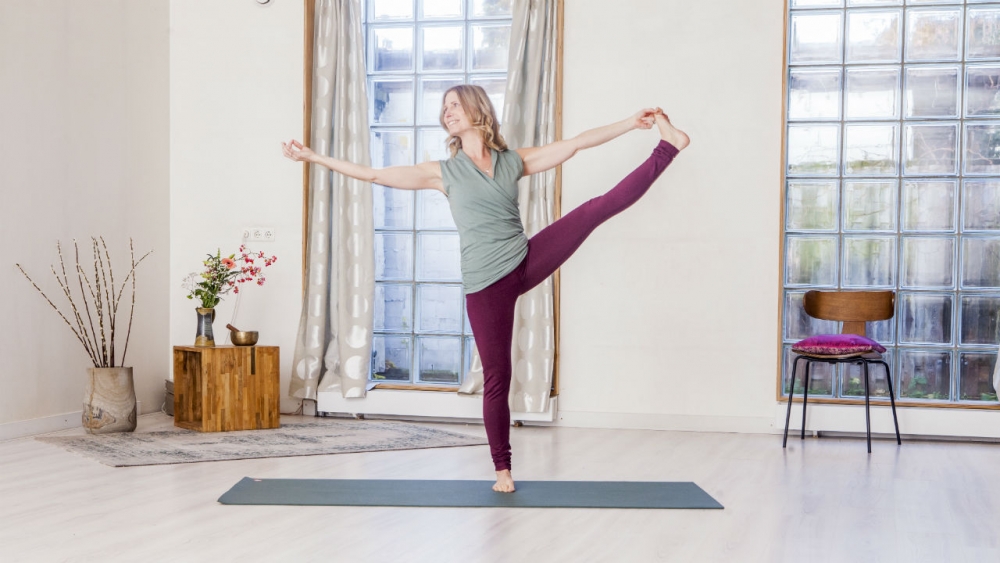Why is it important to find your yoga rhythm?
I believe that one of the most important things in your yoga ‘career’, and indeed your life, is to find what your personal rhythm is. With regards to yoga, once you know when it best suits you to practise – both on a physical and emotional level – then you have a better chance of being the happiest and most balanced version of yourself.
Ultimately that’s what yoga is about – being a balanced human being so you can be loving and kind toward yourself, others and the world.
This can be quite a difficult and advanced thing to do and in our mission to have the ‘perfect’ practice and to achieve certain poses, we often forget to ask: “how does this actually make me feel?”
So I invite you to experiment with your own natural yoga practice rhythm. What kind of yoga suits you best at different times of the day? What is optimal in terms of your body clock, your energy levels and your schedule?
Knowing the answer to these questions will not only help you to create a sustainable practice but to step back from what you think you should be doing and move towards what you feel serves your body and your mind. In other words, making your practice work for you both on and off the mat.
How I found my yoga rhythm
I found my own yoga rhythm through trial and error! At one point in my life I found myself caught up in a very strong morning practice – but I never stopped to ask: how does this make me feel? And I must admit it took an injury before I listened to what my body had probably been trying to tell me for some time.
I shifted my morning practice to a slower more grounded style – the type of practice I would have previously only done in the evenings to wind down. I began to notice that I went into my day a lot less wired, less irritable, and less tired.
After taking stock, researching and experimenting a little with the type of practices I did, I realised the way I’m ‘built’ means grounding, slow, mindful practices serve me better physically and mentally. Of course, what’s right for me, doesn’t necessarily mean it’s right for you and I’m certainly not knocking the benefits of a strong yoga practice. It was right for me at a certain stage of my life and I still do a strong practice sometimes but I build it up slowly, keep the strong part short and then take time to bring myself back down to balance.
It’s all about experimenting with what works for you personally. What I’m inviting you to try is to “switch it up”. If you’ve been practising a certain way for a while, try something different. Keep a note of what you practice, when you practice and in particular, pay attention to how you feel before and afterwards. It can also be useful to be aware of how you feel later that day too.
Remember, in the same way that your taste buds enjoy something that may not agree with your stomach; what your mind craves might not be what your body enjoys or needs.
How do you know what is ‘right’ for you?
Yoga helps you to fine-tune your awareness. The more you practise, the easier it gets; it’s like a muscle. I suggest you take a couple of minutes before your yoga practice to notice how you feel. Give it a moment to show itself. If your system isn’t used to you being interested in how you feel it might take a moment for your body to speak to you. If you feel tired, for example, start with where you are NOW and work with your tiredness, rather than fighting against it.
Keep enquiring…
Although we may have been taught that we need to do our energising yoga practice first thing in the morning or that Yin yoga is something we do at the end of the day, it’s absolutely fine to question whether these things work for you. If you have a busy day ahead, you might find that something calming and relaxing works better for you in the morning. If you’ve had a tough day there may be nothing more you need than to ‘sweat it out’ on the mat when you get home. It’s helpful to keep asking: “Why am I doing this?” “What do I want my practice to bring me?” Remember not to take anything for granted, find what works for you; find your own truth.
What if you don’t have flexibility in your schedule?
Of course, it’s all very well for me to urge you to experiment with practising at different times of the day but if you have limited time and lots of commitments, this might not be an option for you. If the only time you can practise is 5am before the kids wake up (for example), then deciding to relax and accept a situation over which you have no control is a positive choice in itself. Here, the question “what do I need from my practice today?” is a good one to ask, so that you can pick the right practice for you that day and ensure that you use what time you do have to set you up optimally for the day ahead.
It is my hope that by setting aside some time to investigate and experiment you’ll be able to develop a practice that serves you best and is therefore much easier to sustain in the years to come.
Love
Esther

